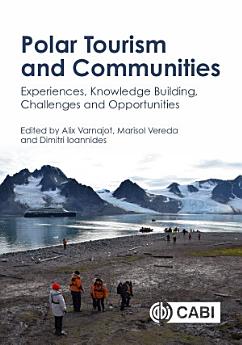Polar Tourism and Communities: Experiences, Knowledge Building, Challenges and Opportunities
Über dieses E-Book
Autoren-Profil
Alix Varnajot is a postdoctoral researcher at the University of Oulu, Finland. He earned his Ph.D. in Human Geography from the University of Oulu in 2020. His Ph.D. dissertation explored conceptual and theoretical developments on Arctic tourism, including place-meaning, places representations and place-making of the Arctic in tourism. His research interests encompass tourism at borders, tourists' performances as well as the development of tourism in Polar regions. More recently, Varnajot's work has focused on the implications of global warming and thawing cryosphere to the future of Arctic tourism, exploring novel and innovative adaptation strategies to climate change for the tourism industry.
Marisol Vereda is a professor of tourism at the Institute of Economic Development and Innovation of the National University of Tierra del Fuego, Antártida e Islas del Atlántico Sur (UNTDF), in Ushuaia, Argentina. After graduating in tourism, she achieved a postgraduate degree in University Education, she earned a Master's degree in Tourism Planning and a PhD in Geography. She has developed an extensive research work about tourism in natural areas and Antarctic tourism. Currently, she leads a research team that studies Antarctic tourism and Ushuaia as a gateway city to Antarctica. She has participated in the Antarctic Treaty Consultative Meetings since 2010 as part of the Argentine Delegation. She has published in and reviewed for journals specialized in the field and has lectured at different universities both in Argentina and abroad. Besides, she is the director of a Master's degree in Antarctic Studies at the university of Tierra del Fuego. She co-authored the books Exploring Tierra del Fuego. A handbook for the traveler at the end of the world (Utopías Editorial) and Tourism in Antarctica (Springer) and contributed with different chapters in other publications. She participates in different networks and/or academic committees such as the International Polar Tourism Research Network, the Antarctic Studies Committee of the Argentine Council for International Relations and the Geographic Names Commission of the Argentine Cartographic Centre. In December 2022 she was incorporated into the Argentine Academy of Tourism as a Number Academic.
Dimitri Ioannides is Chaired Professor of Human Geography in the Institution of Economics, Geography, Law and Tourism and a researcher in the European Tourism Research Institute at Mid-Sweden University. Previously, he taught at Missouri State University and held a part-time position at the Centre for Regional and Tourism Research in Bornholm, Denmark. He has published extensively in various journals including Annals of Tourism Research, Tourism Management and the Journal of Sustainable Tourism on issues such as the economic geography of tourism and sustainable development. He is especially interested in matters relating to the social-equity dimension of sustainability, including the geographies of tourism workers and work. He has co-authored books relating to tourism issues, including the Economic Geography of the Tourist Industry (Routledge). Currently, he is an editor of Tourism Geographies (in charge of special projects) and serves on the editorial board of several other journals. He also edits the New Directions in Tourism Analysis series (Routledge) as well as serving on the board of the International Polar Tourism Research Network. In is a past recipient of the Roy Wolfe Award for Outstanding Contributions to the Recreation, Tourism and Sport specialty group of the Association of American Geographers.





